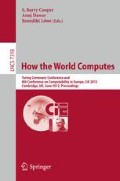Abstract
The mate-in-n problem of infinite chess—chess played on an infinite edgeless board—is the problem of determining whether a designated player can force a win from a given finite position in at most n moves. Although a straightforward formulation of this problem leads to assertions of high arithmetic complexity, with 2n alternating quantifiers, the main theorem of this article nevertheless confirms a conjecture of the second author and C. D. A. Evans by establishing that it is computably decidable, uniformly in the position and in n. Furthermore, there is a computable strategy for optimal play from such mate-in-n positions. The proof proceeds by showing that the mate-in-n problem is expressible in what we call the first-order structure of chess \(\mathord{\frak{Ch}}\), which we prove (in the relevant fragment) is an automatic structure, whose theory is therefore decidable. The structure is also definable in Presburger arithmetic. Unfortunately, this resolution of the mate-in-n problem does not appear to settle the decidability of the more general winning-position problem, the problem of determining whether a designated player has a winning strategy from a given position, since a position may admit a winning strategy without any bound on the number of moves required. This issue is connected with transfinite game values in infinite chess, and the exact value of the omega one of chess \(\omega_1^{\rm chess}\) is not known.
Access this chapter
Tax calculation will be finalised at checkout
Purchases are for personal use only
Preview
Unable to display preview. Download preview PDF.
References
Blumensath, A., Grädel, E.: Automatic structures. In: 15th Annual IEEE Symposium on Logic in Computer Science, Santa Barbara, CA, pp. 51–62. IEEE Comput. Soc. Press, Los Alamitos (2000), http://dx.doi.org/10.1109/LICS.2000.855755
Evans, C.D., Hamkins, J.D., Woodin, W.H.: Transfinite game values in infinite chess (in preparation)
Fraenkel, A.S., Lichtenstein, D.: Computing a perfect strategy for n×n chess requires time exponential in n. J. Combin. Theory Ser. A 31(2), 199–214 (1981), http://dx.doi.org/10.1016/0097-31658190016-9
Khoussainov, B., Minnes, M.: Three lectures on automatic structures. In: Logic Colloquium 2007. Lect. Notes Log, vol. 35, pp. 132–176. Assoc. Symbol. Logic, La Jolla (2010)
Khoussainov, B., Nerode, A.: Automatic Presentations of Structures. In: Leivant, D. (ed.) LCC 1994. LNCS, vol. 960, pp. 367–392. Springer, Heidelberg (1995)
Stanley (mathoverflow.net/users/2807), R.: Decidability of chess on an infinite board. MathOverflow, http://mathoverflow.net/questions/27967 (version: July 20, 2010)
Author information
Authors and Affiliations
Editor information
Editors and Affiliations
Rights and permissions
Copyright information
© 2012 Springer-Verlag Berlin Heidelberg
About this paper
Cite this paper
Brumleve, D., Hamkins, J.D., Schlicht, P. (2012). The Mate-in-n Problem of Infinite Chess Is Decidable. In: Cooper, S.B., Dawar, A., Löwe, B. (eds) How the World Computes. CiE 2012. Lecture Notes in Computer Science, vol 7318. Springer, Berlin, Heidelberg. https://doi.org/10.1007/978-3-642-30870-3_9
Download citation
DOI: https://doi.org/10.1007/978-3-642-30870-3_9
Publisher Name: Springer, Berlin, Heidelberg
Print ISBN: 978-3-642-30869-7
Online ISBN: 978-3-642-30870-3
eBook Packages: Computer ScienceComputer Science (R0)

